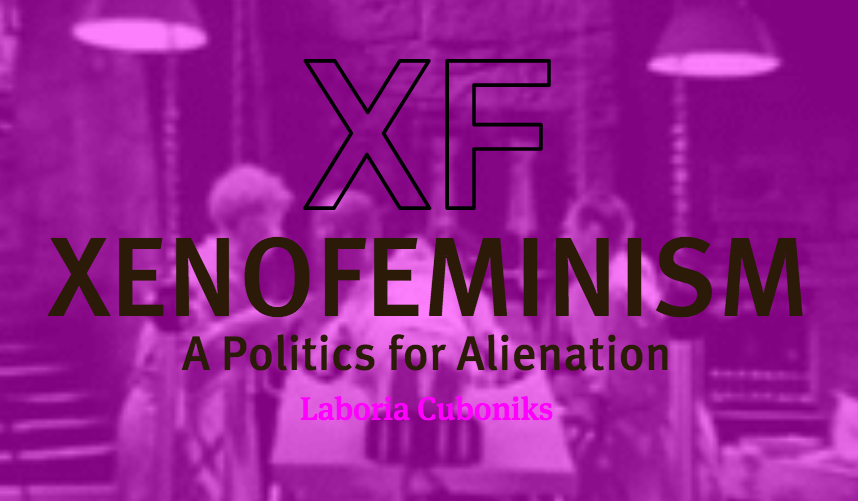Laboria Cuboniks: Xenofeminism: A Politics for Alienation (2015) [EN, DE, ES, RO, IT, RU, SK, SL, SW, FR, PT, FA, PL, DK]
Filed under manifesto | Tags: · alienation, capitalism, feminism, gender, manifesto, politics, technology

“Ours is a world in vertigo. It is a world that swarms with technological mediation, interlacing our daily lives with abstraction, virtuality, and complexity. XF constructs a feminism adapted to these realities: a feminism of unprecedented cunning, scale, and vision; a future in which the realization of gender justice and feminist emancipation contribute to a universalist politics assembled from the needs of every human, cutting across race, ability, economic standing, and geographical position. No more futureless repetition on the treadmill of capital, no more submission to the drudgery of labour, productive and reproductive alike, no more reification of the given masked as critique. Our future requires depetrification. XF is not a bid for revolution, but a wager on the long game of history, demanding imagination, dexterity and persistence.” (opening paragraph)
First published June 2015
GNU Public License
Commentary: Isabel de Sena (2019).
Xenofeminism: A Politics for Alienation: HTML, TXT, PDF (English)
Xenofeminismus. Eine Politik für die Entfremdung: HTML, TXT, PDF (German)
Xenofeminismo. Una política por la alienación: HTML, TXT, PDF (Spanish)
More translations (Romanian, Italian, Russian, Slovak, Slovenian, Swedish, French, Portuguese, Persian, Polish, Danish; added on 2019-3-6)
Laura Bear, Karen Ho, Anna Tsing, Sylvia Yanagisako: Gens: A Feminist Manifesto for the Study of Capitalism (2015)
Filed under manifesto | Tags: · anthropology, capitalism, feminism, gender, kinship, manifesto
“Our title signals a major redefinition of the multilayered historical meanings of the term gens. Gens began as the Roman concept of a family unit descended from a common male ancestor and was scaled up to social distinctions like aristocratic lineage. It was transformed by Lewis Henry Morgan to found the anthropological study of kinship and reveal the “original” matriarchal origins of community. Friedrich Engels then drew on Morgan to argue that the patriarchal form of gens led to the end of matriarchal systems. Gens is also, of course, the etymological root of gender, genus, genre, generations, and generate. We find this term broadly helpful because it carries a long history of the appropriation of human and non-human life-forces by social forms. Its varied usage inspires reflection on the depictions of these life-forces that in turn contribute to forms of social inequality. Moreover, it specifically refers to a history of contradictions between male authority and female kinship ties that signals the mix of capture and generativity that characterizes all social power. Finally, by adopting this term, we play with the irony that a patriarchal unit provides the root for the word gender even as we found our approach to capitalism on a more liberating (but hidden) ancestry of feminist analyses of gender, kinship, and race, as well as other forms of epistemological insights garnered from the margins.” (opening paragraph)
Part of the series Generating Capitalism, Fieldsights – Theorizing the Contemporary, Cultural Anthropology Online, March 2015.
Commentary: Donna Haraway (EnviroHumanities 2015, see note 16)
Comment (0)Catalyst: Feminism, Theory, Technoscience 1(1): Inaugural Issue (2015)
Filed under journal | Tags: · feminism, gender, posthuman, technology, technoscience, theory

“Catalyst is an online, juried journal that expands the feminist and critical intellectual legacies of science and technology studies into theory-intensive research, critique, and practice. It supports intersectional and transnational scholarship and seeks to foster accessibility and experimentation in scholarly form. The inaugural issue demonstrates the scope of Catalyst‘s intellectual and political vision.”
With contributions by Lindsey Andrews, Neda Atanasoski, Kalindi Vora, Jih-Fei Cheng, Anne Pollock, Elizabeth A. Wilson, Jackie Orr, Joanna Zylinska, S. Lochlann Jain, Jackie Stacey, Lilly Irani, Monika Sengul-Jones, Jenny Reardon, Jacob Metcalf, Martha Kenney, Karen Barad, Daphna Joel, Anelis Kaiser, Sarah S. Richardson, Stacey A. Ritz, Deboleena Roy, Banu Subramaniam, a.o.
Publisher University of California, San Diego, September 2015
Open access
ISSN 2380-3312

